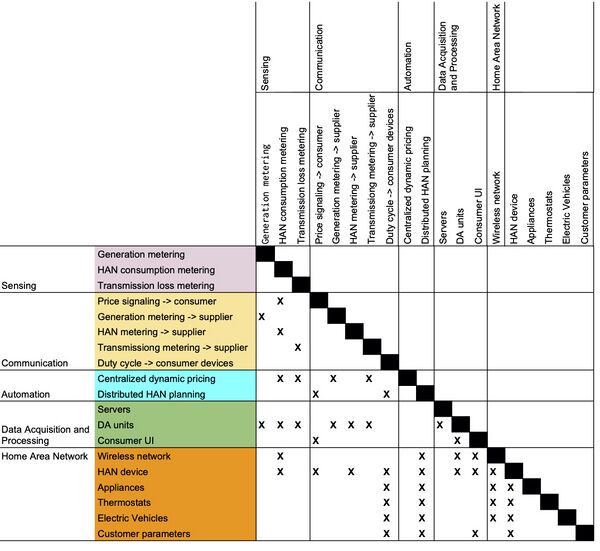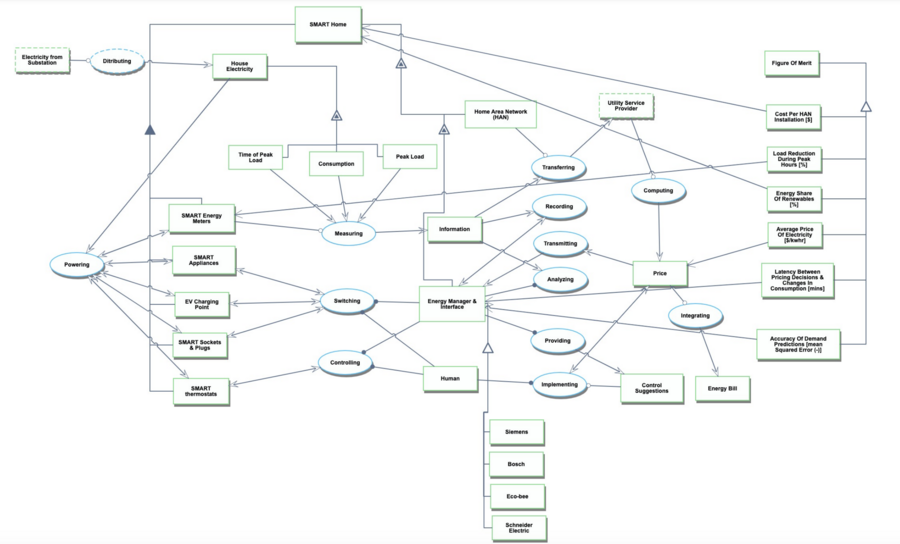Smart Grid Home Area Network for Dynamic Pricing and Demand Management, by Kulkarni, Ozturk, Toeldte
Project Overview
source:https://www-sciencedirect-com.ezproxyberklee.flo.org/science/article/pii/S037877881730823X#fig0005
The proposed smart grid system uses data from sensors at the Home Area Network (HAN) level to make optimal dynamic pricing decisions for electricity, as well as modulating the power consumption of smart devices.
These kinds of energy control technologies have become more important as we move towards an increased share of intermittent renewable energies in electricity generation, and increasingly electrify domains such as transportation and home heating. Inefficient supply and demand matching in electricity generation can result in large plant-to-plug energy losses, on top of the unavoidable transmission losses.
The technology uses data at the generation level and consumer level to make predictions about future energy supply and demand. In case of imbalance, the technology provides price signals to Home Area Networks, which automatically make energy consumption decisions based on some parameters that the consumer determines, taking advantage of the price elasticity of demand for electricity to bring the system back into balance. Furthermore, the technology would inform consumers about their energy use patterns, and the share of electricity sourced by renewables. This would both allow firms to make more profit and/or displace consumer demand to times that have a higher availability of renewable energies, reducing the environmental footprint of electricity.
Large scale smart grid technologies could also better schedule the ramp up/down of nonrenewable sources, and take advantage of the key performance indicators (KPIs) of available energy resources to optimally allocate the duty cycle of potential energy sources. This is however outside the scope of our work.
DSM Allocation
This DSM depicts components of the Energy Management System and their interactions.
Object Process Diagram - OPD
This Object Process Diagram depicts how the Energy Management System at the Home Area Level works.
Figures of Merit (FOM)
Electricity consumption varies by time of day, depending on social practices of consumers. This often does not correspond well to the availability of energy, since most renewable sources exhibit variable supply. The diagram below, by the US Energy Information Administration, shows the degree of variability of energy consumption by time of day and month of year. Thus, one of our figures of merit is load reduction during peak hours [%].
The primary use case of dynamic pricing is for demand reduction during peak consumption periods, to be able to match available capacity with demand. Although there are a few smart grid systems with dynamic pricing, the availability of data with respect to demand response is sparse. However, there are a number of pilot studies in the academic literature that demonstrate favorable reductions in peak demand with dynamic pricing. This plot is from a survey paper by Faruqui et. al where terms are defined as follows:
- TOU: time of use pricing
- TOU w/ Tech: time of use pricing with technology enablers
- PTR: peak time rebate
- CPP: critical peak pricing
- CPP w/ Tech: critical peak pricing with technology enablers
- RTP: real time pricing
- RTP w/ Tech: real time pricing with technology enablers
The conclusion is that the efficacy of dynamic pricing in achieving the peak demand reduction FOM depends on the particular implementation of the scheme. Our technology would implement a combination of TOU + CPP and RTP systems, and would be enabled both by in-home sensor technologies as well as user-facing applications.
The theoretical limit of peak demand reduction depends on location, so that demand always matches the supply of energy, which is optimally produced by a mix of renewable and nonrenewable sources. Unfortunately, the technology is in its infancy, and all of the pilot studies were done in the first decade of the 20th century, so it is difficult to discern any trends. However, we would assume that improved wireless communication, cloud data storage, machine learning and better sensing over the last 10 years can only improve the efficacy of dynamic pricing in peak demand reduction.

